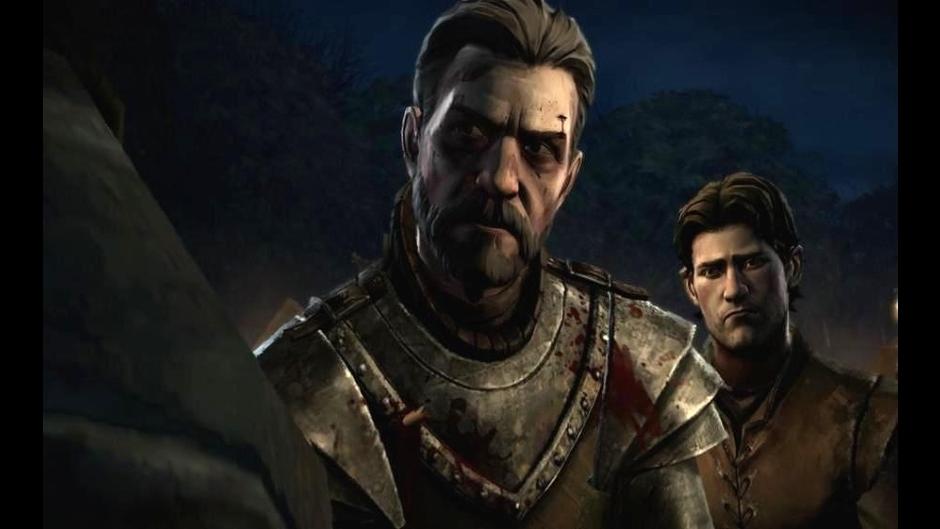Westeros is a dangerous, unforgiving place full of cutthroats who both lurk in the shadows and sit amongst thrones. It’s a place where every new day you spend alive is one more day you can count yourself amongst the lucky, even though death isn’t always the worst of fates.
At least, that’s what I’m told. Full disclosure: I haven’t read a single sentence or watched nary a minute of any Game of Thrones property. Telltale’s somewhat unbalanced, achingly plodding, yet promising interpretation of the franchise is my first experience with said franchise as a whole. I didn’t have the ability to critique just how faithful the game is to its source material, and couldn’t have heart-fluttering moments when characters from the show would rear their heads in assorted parts of the three to four hour adventure. Could the ineffectuality of this fan service have been part of the overcast that glooms my experience with Iron from Ice?
Possibly, but I blame the story itself. Placing you in multiple different perspectives of the denizens of House Forrester, the struggle is incredibly real for this fledgling little community. The Starks, the powerful family the Forresters previously pledged allegiance to, have fallen. The Boltons, a group of predictably heinous douchebags, have taken their place. New rules are being set, as new appropriations of resources and property are being instilled. The sociopathic Ramsay Snow is taking a victory tour around their newly acquired properties, making sure everyone knows who’s in charge. Forrester is next on the list, and with the house in disarray after the death of its former Lord, they’re desperate for footing in this rapidly changing and hostile political geography.
All very interesting stuff at arm’s length, if not a bit bemusing. Telltale fails to truly make this scenario intriguing in more than just a couple of instances. There are tense moments where you spend every tick of the dialogue timer agonizing over what the right choice might be, but far too often I found myself wondering what the difference between the options were. Or more importantly, I spent that time trying to care about the situation at all.
Most of the plot feels this way. It’s too often consumed with over developing the main ideas, and not with actually getting to the big events. Too many times in any particular chapter I was subjected to talking to everyone who can be spoken to about the same things, all largely having different shades of the same opinions. This is especially evident when playing House Forrester heir-apparent Ethan, who is reminded by almost everyone who speaks to him that he is the new Lord of the House, and should act like/be treated like such. In select few conversations, some characters will even tell you this in subsequent lines. Iron from Ice is Telltale’s dialogue webs at their most droll.
Many of the supporting characters serve as the real source of promise for the future of this series. They are the best expressions of the new world order’s effect on Westeros, be it good or bad, and serve as glaring reminders of how bland your protagonists are in comparison. As they all seem to possess the same cautious uncertainty for the future of House Forrester, they all take on their positions as blank slates to receive your commands. They never feel as nuanced or varied as any character you make them talk to. Especially once-squire Gared, whom is both the catalyst for many of this episode’s biggest events, and the least engaging character in the cast, playable or not.
The characters themselves may be hit or miss, but the voice acting is top notch. A lot of my gravitation towards the more central NPCs came by way of how convincing the voice work made them feel. Ser Royland’s aggressive desperation is palpable and justified, thanks to Brian George’s interpretation. Robin Downes and Geoff Leesley also bring a welcome life and balance to some of the central characters.
They also look pretty good. This is by far Telltale’s most realistic art work, and for the most part it works. Some characters can’t help but look sort of cartoony, especially young people with strangely large heads. Moreover, some characters from the TV show who debut in this series look a bit alien when compared to their real-life counterparts (sorry Natalie Dormer). Environments are well designed and rendered, and the color palettes and architecture change enough to make the various places you’ll go in this adventure look remarkably distinct.
When the ambling plot does narrow into it’s big events, they are executed quite well. The consequences of some of these bigger moments are truly monumental in terms of what you’ve been lead to believe about the story arcs so far. In a game that can very quickly bore you, it can just as quickly surprise you.
The action is light, and its probably for the better. The quicktime action scenes were disjointed and jarring at their worst, and passively adequate at their best. Telltale has yet to make these sorts of scenes engaging, as far as playability is concerned, across any of their franchises, and Game of Thrones serves as a great argument against their inclusion altogether.
Closing Comments:
Iron from Ice isn’t a bad start to the Game of Thrones series, but it should definitely be a cautionary tale for both Telltale and curious players looking to make this their first trip to Westeros. Without the persistent glee of interacting directly with this rich universe you love, the glaring pacing issues and frankly boring plot may turn you off to what this series has to offer. Including a game changing final act, this series looks like it’s full of surprises. I just hope the next episodes don’t take the long way to get to them.








